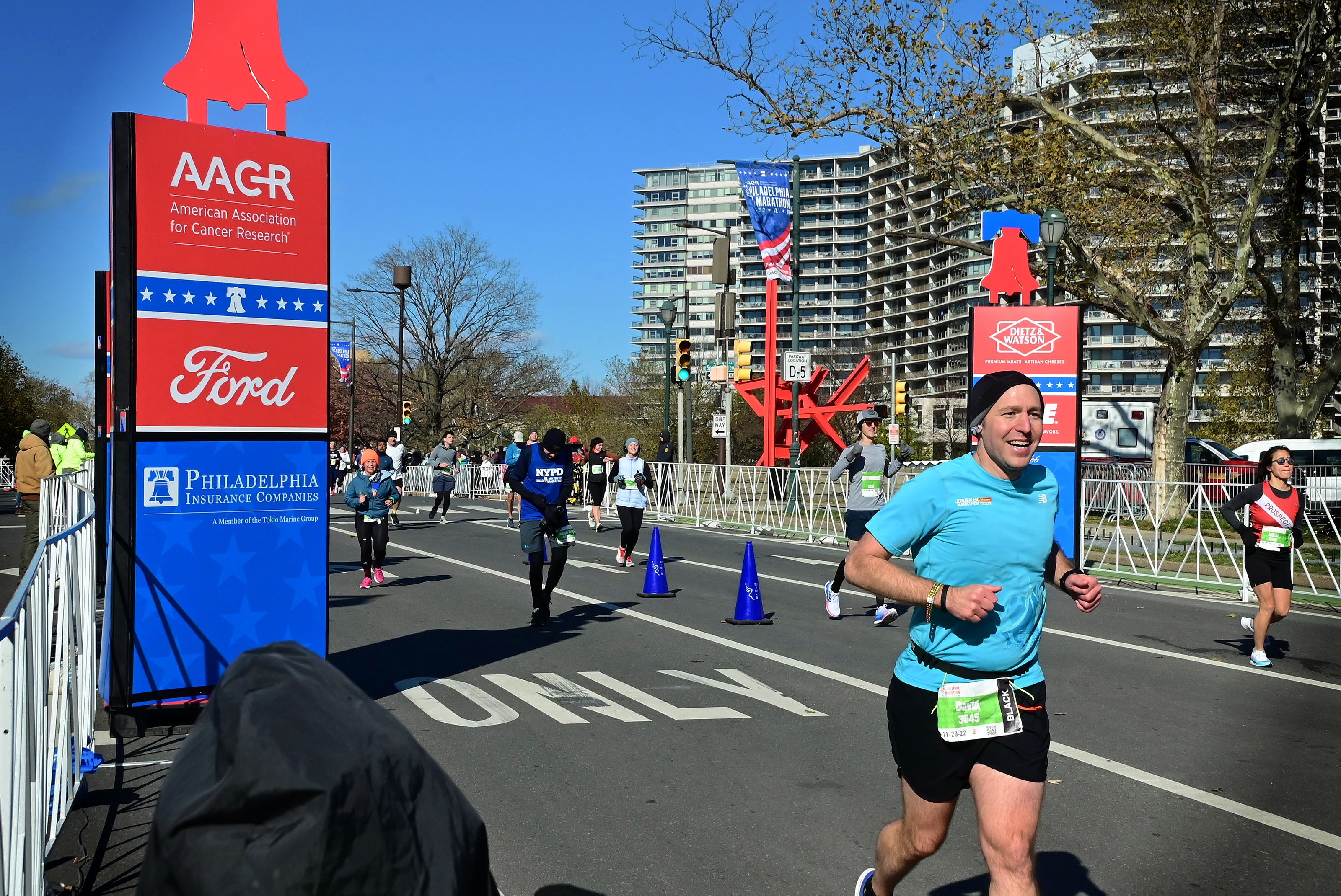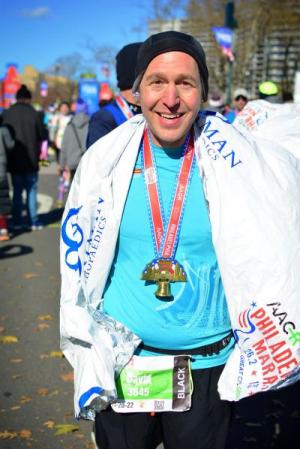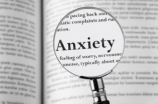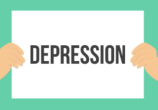This Man, 26.2 Miles: David H. Rosmarin Goes the Distance for ADAA
This Man, 26.2 Miles: David H. Rosmarin Goes the Distance for ADAA

See How He Runs
David H. Rosmarin, PhD, ABPP, runs a lot of things. He runs the Center for Anxiety, he runs the Spirituality & Mental Health Program at Harvard’s McLean Hospital, he runs a popular blog entitled Thriving with Anxiety, and he literally runs. Marathons, that is.
On November 20th, 2022, Dr. Rosmarin ran his 10th marathon in Philadelphia, the City of Brotherly Love. The city where Rocky swiftly ran up the 72-stone steps to the museum in a symbol of triumph over a struggle. The city that houses the famous symbol of freedom, the Liberty Bell. For the second year in a row, Dr. Rosmarin ran a fundraising campaign in conjunction with his marathon, raising a total of over $5,000 for ADAA.
In this month of Thanksgiving and #GivingTuesday, we wish to give a heart-felt thanks to this amazing ADAA member for his dedication to the treatment of anxiety and depressive disorders. Dr. Rosmarin has the freedom to donate money to any cause or organization he wants, and he chose us. Through his work, his research, his running practice, and his partnership with ADAA, Dr. Rosmarin is helping to raise awareness, educate the public, provide treatment, and show that the struggles that come with mental health conditions like anxiety and depression can be overcome.
Between all the running around, Dr. Rosmarin took the time recently to speak with ADAA about depression. While it is a mental health condition that is increasingly being understood by science, it still eludes many people when it comes to explaining it to friends, family, and loved ones.
Here is some of his advice on discussing depression and dealing with it.
Who Will Run the Extra Mile with You?
“Depression can make it difficult to find the right words to express oneself,” said Dr. Rosmarin. For that reason alone, he recommends that people with significant symptoms seek professional help. However, opening up to family or friends is often a critical first step. “It’s important to identify people who will be receptive, understanding, and supportive of your emotional needs,” he said, adding from his own experiences as a marathon runner that having people to cheer you on makes a world of difference.
As a society, we are becoming better at talking openly about mental health in general, and depression and anxiety in particular. We are more emotionally sensitive, less judgmental, and more free from stigma. With that said, there is no obligation to reveal your depression to others. “If I’m having a bad day, there are certain people I am not going to call - they’re just not on my list for emotional support. But if I didn’t have anyone to go to, that would be extremely hard,” Dr. Rosmarin said, speaking from his own experience.
“Unfortunately, not everyone in your life is going to be someone you can rely on, and it may be better to avoid speaking about depression with certain people,” he added, clarifying that identifying just one or two people to “run beside you” is often enough to forge a deeper connection for all parties.
 Lean into Your Feelings
Lean into Your Feelings
It’s critical for people with depression not to suppress or deny that they are struggling. “Sorry to give another running analogy,” Dr. Rosmarin quipped, “but after 18-20 miles there is a common mental struggle called ‘the wall’ which almost all marathoners experience. The only way over ‘the wall’ is to recognize that it’s not personal and lean into the pain to work through it versus trying to avoid or circumvent it. That is the best way forward.”
“With depression,” Dr. Rosmarin added, “it’s important to allow yourself to feel just what you are feeling. It’s not easy, and that’s ok. Pretending that everything is fine, or avoiding those negative feelings, only makes things worse. Accepting the pain without judgment is a critical step towards recovery.”
This is cliché, but depression often feels like a dark cloud over your head. “The immediate goal should not be to feel better or happy, but rather to function - go to work, go to school, participate in activities - and let the depression be there. If you take that approach, it will often fade over time,” he said.
Along these lines, depression has never been more widely present or acute than it is today, yet many people with depression have a sense that they are alone in how they feel and judge themselves for feeling sad. “Let’s be clear that between 10 to 15 percent of the US population has at least one depressive episode over the lifespan - that’s 30 to 50 million people!” Dr. Rosmarin said, putting things into perspective.
Depression will Run its Course
Dr. Rosmarin has a uniquely positive message for those with depression: “Dealing with depression by seeking professional help, connecting with others who you can rely on, and working through painful thoughts and feelings can not only alleviate sadness but can be a catalyst to growth in your life.”
He gave several examples of former patients who, while working through their depression, made major life decisions that set them on a better path for the future. “Yes, some of my patients have taken up running,” Dr. Rosmarin shared jokingly, “but more importantly, many of them made career changes, relationship changes, and even grew spiritually from the experience of a depressive episode.”
If you think about depression as a life-issue that needs to be addressed, confronted, and dealt with, it not only runs its course quicker, but new vistas may open up that you otherwise may never have seen.
Ready, Set, Share the Struggle
Dr. Rosmarin concluded our interview with some heartfelt and personal comments.
“I run to keep fit and also for my own emotional wellbeing. Yes, running a marathon is a physical challenge, but it’s even more of a mental challenge to keep going when things get hard. In this way, I feel a kinship with my patients whom I ask to push against their anxiety, depression, and other symptoms each and every day. All human beings - regardless of our levels of anxiety and depression - need to accept, embrace, and share our struggles with others. We also need to be there for each other and cheer each other along. This is why I’m so proud to support ADAA!”




















